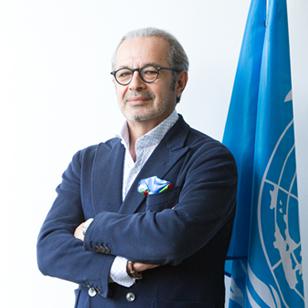Director's view: Takeaways from 20 years of learning
This year is the 20th anniversary of the UN System Staff College (UNSSC). In 2002, after years of hard and consistent work, the founders of the College were able to secure the UN General Assembly resolution that formally established an independent UN organization dedicated to building the capacity of the UN and its stakeholders. Starting from a modest beginning, training 1,200 UN staff in its first year, today the College has become a centre of excellence for system-wide learning and training. In 2021, UNSSC was the premier provider of knowledge to over 20,000 learners from the UN, governments, civil society organizations, and the private sector.
The success of the College can be attributed to several factors. Key among them: 1) A clear and tangible mandate, 2) demand-driven portfolio of learning offerings: 3) the consistent drive for creativity and innovation; 4) an entrepreneurial-based financing, and 5) dedicated and committed personnel.
A clear mandate
UNSSC’s mandate is unique as there is no other organization within the UN family that is mandated by the General Assembly to build the capacity of the personnel of UN system and its stakeholders. Of course, many organizations within the system have their training departments. Their target audience is mainly limited, however, to their own staff and at times their governmental counterparts. Learning initiatives designed by external sources targeted at UN staff from across the system are often flash-in-the-pan and tend to fizzle out after some time. Perhaps a contributing factor to the popularity and the longevity of our programmes (e.g. 12 years the UN Leaders Programme) is due to the fact that they are designed by the UN to break institutional silos. The promotion of one UN flag instead of multiple institutional flags is one of the key primary learning objectives of our learning portfolios.
The College is a UN organization that emanated from the UN Chief Executives Board for Coordination (CEB) and is actively connected to system-wide coordination mechanisms such as the High-Level Committee on Management (HLCM) and the High-Level Committee on Programmes (HLCP). As such, UNSSC is fully abreast of the current management and programmatic priorities of the system. These linkages make our academic offerings demand driven and timely. In addition, the high-level representation of eight UN organizations on our Board of Governors, chaired by the Secretary-General’s Chef de Cabinet, guides the College to focus its work on the urgencies and the priorities of the UN in face of today’s global challenges.
A focus on interactive learning
The College operates on a premise that to be fruitful, learning has to be engaging. Whether delivered as an in-class experience or through virtual platforms, effective learning takes place when it’s interactive. While benefiting from high calibre and diverse academic faculty and the latest technology, our programmes always carve out spaces for sharing of ideas and experiences by the learners. This makes our offerings not solely a learning experience but a formidable opportunity for knowledge sharing and networking.
Entrepreneurship and financial sustainability
Entrepreneurship is a part the DNA of the College. With over 60 percent of its annual income generated through contracts, participant fees, and product-targeted donor contributions, the College is sharply cognizant of its business perspective. As a UN organization, UNSSC does not exist to make profits, yet it focuses on recovering its costs. We are conscious of the market and our competitors. We are aware that our partners and clients have many choices when it comes to selecting the best and most relevant learning and training products, hence our commitment to quality and client and partner satisfaction is our number one priority. Our commitment to developing and delivering quality products is the essence of our solid growth and financial performance over the years.
Dedicated personnel
It is no secret that no organization can flourish without passionate and committed staff, and the College is no exception to this rule. Since the outbreak of COVID-19, the pandemic has tested this theory in practice. Today’s successful results demonstrate our resilience and resolve in the face of serious challenges. Working hard and long hours during lockdowns, mixing personal and professional lives, working remotely, and gradually back in the office, the staff have reconfirmed their steadfast passion for their profession, job, and their organization.
The success of the College today should not be viewed as the result of its recent past but as the culmination of 20 years’ worth of work. The current high-standing position of the College within the UN system should also be credited to the vision of its founders, the unwavering support of the senior UN leaders who believed in the idea, the trust of the member states, and critically, its personnel over the past 20 years.
While the College is celebrating its 20th anniversary during my tenure as Director, my predecessors should also be credited for its present successes and accomplishments. The former Directors: Carlos Lopes, Staffan de Mistura, Tim Cartwright, and John Machin never stopped short of doing their best to take the College a notch higher in recognition and effectiveness, and I’m privileged to be part of this company. In the next 20 years, this list will grow. For now, however, it is my honour to be associated with the UN System Staff College – also known as “the College.”
